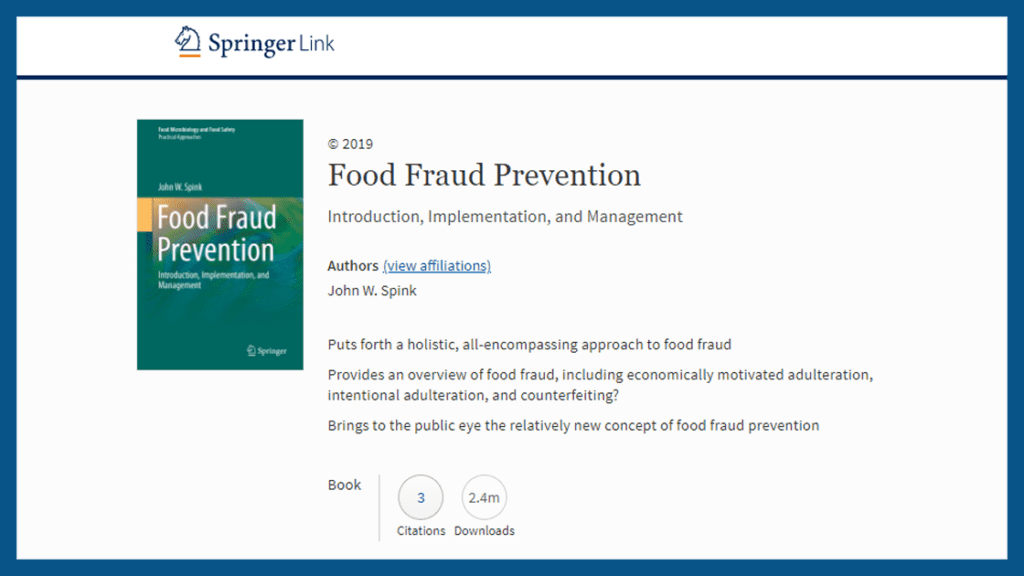The Food Fraud Prevention textbook has over 2.4 million chapters downloaded! With nineteen chapters, that is equivalent to 126k full books downloaded. Researchers are finding this resource since many of those downloads are through university libraries.
I first approached Springer Publishing in 2013 about me writing a food fraud prevention textbook. At that time, the Global Food Safety Initiative (GFSI) was still conducting a food fraud think tank, and the GFSI food fraud position paper wouldn’t be published until the end of the year. (For those who don’t know about GFSI, it is the benchmark for almost all food safety standards and certification such as FSSC 22000, SQF, IFS, BRC, and others – thus, a GFSI requirement is essentially required for all of the food industry.) While I kept writing, creating a book resource didn’t feel right until the GFSI requirements were confirmed, required, and implemented. If a food fraud textbook was published before the GFSI requirements were defined… then the information and recommendations may have immediately become obsolete.
After GFSI published their Food Fraud Technical Document in May 2018, the food industry knew the direction of the food fraud requirements and that they would be enforced. At that point, I went into hyperdrive to finish the book.
Writing a nineteen-chapter, 700+ word textbook was exhausting. Also, this was a summary of the previous ten years of my scholarly activity. I had the drive to get the book “right” and provide a “comprehensive” resource. I think that goal was accomplished.
The textbook has been a valuable resource for me, and I’m pleased to see so many downloads by other readers. Many of the downloaded chapters have been through university libraries, so emerging scholar students and researchers are finding this resource. Due to the widespread availability of the book and building upon the many downloads, the citations and impact will increase.
Comments from Foreword Authors – Excerpt
Statements of support by leaders of industry, government, and academia:
Mike Robach, PhD
Former Chairman, Board of Directors, Global Food Safety Initiative (GFSI)
Former VP of Food Safety, Quality and Regulatory, Cargill Incorporated
“This book focuses on tools that enable solutions to more effectively identify and manage the risks of food fraud. It covers all the activities focused on prevention starting with the criminal motivation through the responsibility of companies, from the boardroom to the factory floor to the farm. This groundbreaking textbook provides a full picture of food fraud and is filled with tools that companies can use to establish preventative systems and train employees to deal with this real threat to the integrity and safety of our food supply around the world.”
Peter Whelan
Director of Audit and Investigations, Food Safety Authority of Ireland (FSAI)
Irish Food Fraud Contact Point, Food Fraud Network, European Union
Advisory Board Member, EU Food Integrity Project
Irish lead for the Codex e-Working Group on Food Fraud
“Over the years, Dr. Spink has been a leader and partner for a wide range of food fraud-related groups, and this textbook is the summary of those interactions and insights. This book advances food fraud prevention as a specific area of study and will support the development of a more strategic approach in the fight against food crime. This book provides useful tools for those wishing to reduce the food fraud opportunity and to protect consumer health and interests.”
Neal D. Fortin, JD
Director, Institute for Food Laws and Regulations (IFLR)
Professor, Food Science and Human Nutrition, College of Agriculture and Natural Resources, Michigan State University
“John Spink brings an important perspective to this field. Food lawyers tend to look at food fraud from a legal liability viewpoint. Yet, the reputational damage can far exceed the penalties in the laws. Food safety experts tend to approach the topic as health and safety risks. Yet, the clever fraudsters seek economic advantage and may present a health risk. … Yet, the nature of supply chains can muddle such analysis. To deal with these seeming contradictions, John Spink brings a multidisciplinary approach to the topic.”
The field of food fraud prevention is constantly evolving and growing. This book was created to be a foundation that will remain helpful as the field continues to develop. If you are working on food fraud prevention, then this book is an essential resource. Also, with 2.4 million chapters downloaded, you’ll be joining a big group of like-minded scholars.
Reference: Spink, John W (2019). Food Fraud Prevention – Introduction, Implementation, and Management, Food Microbiology and Food Safety series, Springer Publishing, New York, eBook ISBN 978-1-4939-9621-6, DOI 10.1007/978-1-4939-9621-6, Hardcover ISBN 978-1-4939-9619-3, Edition Number 1, Number of Pages XIX, 662.

